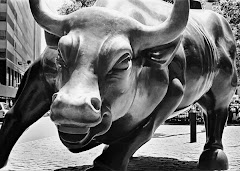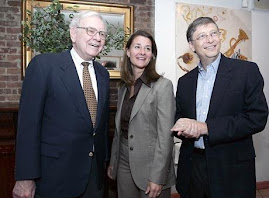The following article from Business Times is an excellent report and I shared the same view. When you walk around city area or onboard a train, you will see adverts saying something like stock prices are low, hidden opportunity, this and that has strong fundamentals etc. I always laugh at it. It was all crap to me but I don’t blame the fund managers. This is because if people stop buying the funds and pull out their money, then the fund managers and analysts will be out of job soon.
The following is a good article especially to those with the idea of rushing into the market to buy while it is cheap. As always, how do you define “cheap”? Remember; always to take cue from global/local economy for your investment decision. The economic indicators are the leading indicators.
===================================
Business Times - 02 Oct 2008
Time to buy? No - patience is a virtue
By R SIVANITHY
WHENEVER stock markets behave as they are now, it's tempting to ask whether it's time to 'bargain hunt'. Indeed, as each passing day brings a new low - be it 24, 25 or 26 months for the Straits Times Index - the temptation to buy probably grows stronger, aided no doubt by a steady stream of 'buy' calls from brokers, all and sundry.
So will it soon be time to buy? Maybe it will? And perhaps for the Straits Times Index, the fact that the 2,300 level has held twice in the past fortnight suggests this may be where there is strong support?
Our take, though, is that there is no need to rush and that patience is a virtue. Brokers and independent researchers have consistently under-estimated risks to the downside for the past year, so their 'buy' calls should be taken not with a pinch of salt but a bucket.
Analyst credibility aside, a major reason for saying this is that despite America's woes, and despite it triggering the biggest financial meltdown ever, US stocks have not capitulated yet. Even after Monday's 7 per cent collapse, the Dow Jones Industrial Average was down only 22 per cent this year and the S&P 500 down 25 per cent - much less than the 35-50 per cent falls suffered by other markets.
From its all-time high, the Dow's loss to 10,365 was 27 per cent and the S&P's loss 28 per cent - over almost a year, compared with the 20 per cent crash in one day on 'Black Monday' Oct 19, 1987.
Seen in this light, the current losses on Wall Street could justifiably be taken to be part and parcel of a normal bear market and not really that much cause for concern.
Why has Wall Street not fallen as much as other markets? One possibility is the huge amount of liquidity the US Federal Reserve has pumped into the system. But more likely, it's the still-lingering hope of a government-led bailout, despite the initial proposal being rejected.
If a modified proposal is cobbled together before the end of this week and if this is again rejected, the full-scale removal of a 'bailout premium' will see US stocks start to reflect their true fundamental values.
Furthermore, it is debatable whether any US Treasury-led bailout would have any effect at all. Recall that on Monday, markets went into a tailspin many hours before the US Congress voted on the plan. So, even if a second plan is pushed through and even if this does push stocks up, it can only be a matter of time before reality sets in with regard to the US market and its fundamentals. And once this happens, investors might just cotton on to the fact that US stocks are grossly over-valued.
Bloomberg's analytic service gives the S&P 500 as trading at a historic earnings per share consensus analyst estimate of US$51 and a forecast figure of US$83. With banks disappearing, unemployment rising, consumer spending shrinking, no growth to look forward to, no bottom yet in housing and a possibly vicious recession just around the corner, how likely is it that US corporations will report such a big jump in earnings?
As for the local market, Citi Investment Research warned last week that it is possible for the STI to fall to 1,800 - a warning many investors reckon is too pessimistic. But if the index were to drop to 1,800, that would only take it to a four-year low which, given the huge risks to growth posed by America's problems and the unpre-cedented nature of the present bank failures, is arguably within reason.
The upshot of all this is that risks are still tremendously high and that Wall Street is still heavily exposed to the downside.
Investors should also realise that even if the STI's bottom does lie at 2,300, this does not automatically mean the start of a new bull market - stocks can drift for years within narrow bands before embarking on any uptrend. As such, it is clearly not time to buy yet.
The following is a good article especially to those with the idea of rushing into the market to buy while it is cheap. As always, how do you define “cheap”? Remember; always to take cue from global/local economy for your investment decision. The economic indicators are the leading indicators.
===================================
Business Times - 02 Oct 2008
Time to buy? No - patience is a virtue
By R SIVANITHY
WHENEVER stock markets behave as they are now, it's tempting to ask whether it's time to 'bargain hunt'. Indeed, as each passing day brings a new low - be it 24, 25 or 26 months for the Straits Times Index - the temptation to buy probably grows stronger, aided no doubt by a steady stream of 'buy' calls from brokers, all and sundry.
So will it soon be time to buy? Maybe it will? And perhaps for the Straits Times Index, the fact that the 2,300 level has held twice in the past fortnight suggests this may be where there is strong support?
Our take, though, is that there is no need to rush and that patience is a virtue. Brokers and independent researchers have consistently under-estimated risks to the downside for the past year, so their 'buy' calls should be taken not with a pinch of salt but a bucket.
Analyst credibility aside, a major reason for saying this is that despite America's woes, and despite it triggering the biggest financial meltdown ever, US stocks have not capitulated yet. Even after Monday's 7 per cent collapse, the Dow Jones Industrial Average was down only 22 per cent this year and the S&P 500 down 25 per cent - much less than the 35-50 per cent falls suffered by other markets.
From its all-time high, the Dow's loss to 10,365 was 27 per cent and the S&P's loss 28 per cent - over almost a year, compared with the 20 per cent crash in one day on 'Black Monday' Oct 19, 1987.
Seen in this light, the current losses on Wall Street could justifiably be taken to be part and parcel of a normal bear market and not really that much cause for concern.
Why has Wall Street not fallen as much as other markets? One possibility is the huge amount of liquidity the US Federal Reserve has pumped into the system. But more likely, it's the still-lingering hope of a government-led bailout, despite the initial proposal being rejected.
If a modified proposal is cobbled together before the end of this week and if this is again rejected, the full-scale removal of a 'bailout premium' will see US stocks start to reflect their true fundamental values.
Furthermore, it is debatable whether any US Treasury-led bailout would have any effect at all. Recall that on Monday, markets went into a tailspin many hours before the US Congress voted on the plan. So, even if a second plan is pushed through and even if this does push stocks up, it can only be a matter of time before reality sets in with regard to the US market and its fundamentals. And once this happens, investors might just cotton on to the fact that US stocks are grossly over-valued.
Bloomberg's analytic service gives the S&P 500 as trading at a historic earnings per share consensus analyst estimate of US$51 and a forecast figure of US$83. With banks disappearing, unemployment rising, consumer spending shrinking, no growth to look forward to, no bottom yet in housing and a possibly vicious recession just around the corner, how likely is it that US corporations will report such a big jump in earnings?
As for the local market, Citi Investment Research warned last week that it is possible for the STI to fall to 1,800 - a warning many investors reckon is too pessimistic. But if the index were to drop to 1,800, that would only take it to a four-year low which, given the huge risks to growth posed by America's problems and the unpre-cedented nature of the present bank failures, is arguably within reason.
The upshot of all this is that risks are still tremendously high and that Wall Street is still heavily exposed to the downside.
Investors should also realise that even if the STI's bottom does lie at 2,300, this does not automatically mean the start of a new bull market - stocks can drift for years within narrow bands before embarking on any uptrend. As such, it is clearly not time to buy yet.





.JPG)




